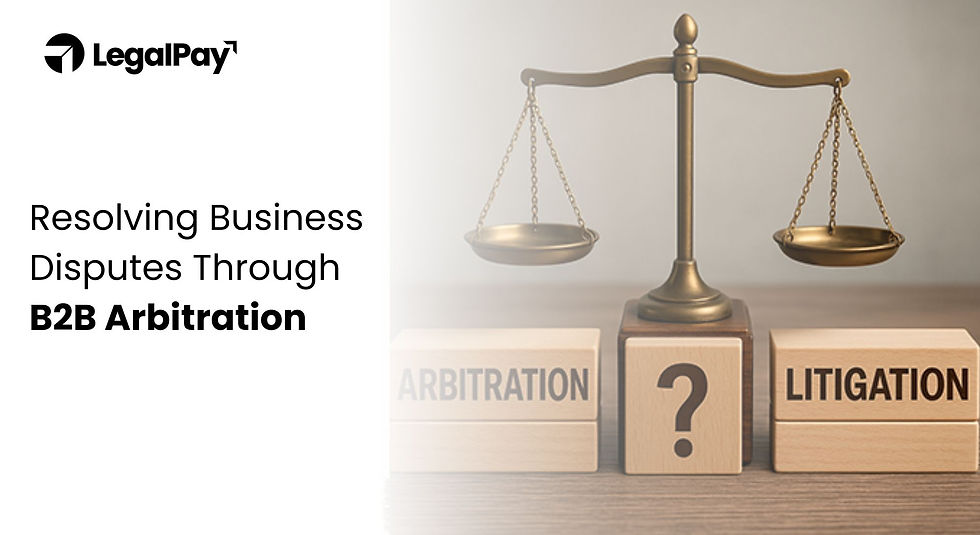Meaning, process and scope of arbitration
- LegalPay

- Jun 14, 2021
- 3 min read

Arbitration: It is a form of alternative conflict resolution that was developed to avoid the need of the courts and to resolve problems swiftly and pleasantly. An amicable resolution does not imply that you must compromise at all costs. Arbitration is a method of resolving disputes through the use of an arbitrator. It entails appointing a neutral third party who is knowledgeable about the arbitral question. All parties are bound by the rule as well as the time restrictions imposed by the arbitrator for resolving the issue.
The arbitration agreement
The arbitration agreement will determine important elements of the process. For example:
Is the tribunal going to be made up of one person or three
What criteria will be used to choose the arbitrators
Where will the arbitration take place, and where will the legal 'seat' or location of the arbitration be
Will the arbitration be held in line with the rules of a certain Arbitration Act or will it be held on a "ad hoc" basis
Arbitration Clause - A contract or clause that states that if a dispute emerges between the parties, the disagreement will be resolved through arbitration.
Arbitration notice-If a dispute arises and a party chooses to pursue it through arbitration, the party against whom the default has been committed will send an arbitration notice, which will initiate the arbitration process between the parties.
Appointment of Arbitrators- After receiving notice from the other party, both parties will appoint arbitrators according to the arbitration agreement or arbitration clause.
Statement of Claim-The writing of a statement of claim is the next step in an arbitration procedure in India. The dispute between the parties, the events that led to the conflict, and the compensation sought from the defaulting party are all included in the statement of claim. The opposite party might respond to the statement of claim with a statement of counterclaim.
Hearing of Parties-Parties will be heard by the arbitral tribunal, as well as their evidence.
Award-The arbitral tribunal will make a decision after hearing both sides. The tribunal's ruling is known as "Award," and it is binding on the parties. The High Court, on the other hand, can hear an appeal against the arbitral award within 90 days.
Execution of Award-After the tribunal has approved the award, it must be carried out. With the assistance of a qualified arbitration lawyer, the party who has been awarded must file for execution or enforcement of the award.
Process of Arbitration
Since an oral arbitration clause has no significance in an arbitration court, the parties should enter into a contractual agreement that includes the arbitration clause.
If a disagreement emerges between the parties, they must follow the dispute resolution processes outlined in the arbitration clause to resolve it.
After that, the parties must invoke the arbitration clause, which involves Section 21 of Arbitration & Conciliation Act 1996 after which the other party may or may not agree to your invocation.
As pointed out in the Perkins case, you may have to go to court to choose an impartial arbitrator. There are only two ways to appoint an arbitrator: one is to give notice of such appointments under Section 21 of Arbitration and Conciliation Act 1996, and the other is to have the court appoint an arbitrator under Section 11 of Arbitration and Conciliation Act 1996.
Once this is completed, the arbitrator must come into reference and make a declaration pursuant to section 13-16 of Arbitration and Conciliation Act 1996, stating that he has not been conflicted in any way and that he has no de facto or de jure responsibility as an arbitrator. He must also declare whether he has an interest in the subject matter of the dispute, whether he is related to either party in the arbitration, and whether he has been appointed as an arbitrator by either of the parties' counsel on more than three occasions. He can only proceed with the arbitration following this declaration.
After the arbitrator begins the arbitration, he has 12 months to complete it and submit an application extendable by 6 months.
After that, he must render his award, which can be enforced as a civil court judgement or as a regular award issued by any court.
Then comes Section 34 of Arbitration and Conciliation Act 1996, which states that if an award is made, it can be contested in court on very limited grounds, and that this is a time-limited procedure.
After the award is finalised, the next stage is Section 36 of Arbitration and Conciliation Act 1996, which discusses the award's enforcement.




Comments